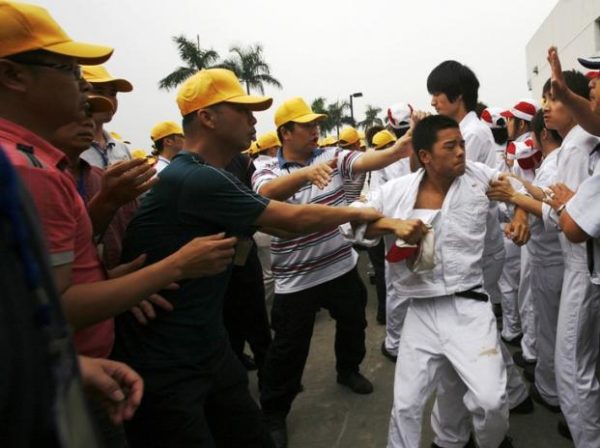One of China’s largest recent strikes shows the need for independent workers’ unions
Li Yiming, chinaworker.info
Once again China’s official pseudo trade union, ACFTU (All China Federation of Trade Unions), the only union legally allowed, has betrayed workers in struggle, acting as a second police force for the capitalists. This time, against the magnificent three-week long strike by Flex workers in Zhuhai, southern China. Involving 6,000 workers at five factories, and with an impressive degree of organisation, this was the largest strike in China for two years.
The strike at Multek, a printed circuit manufacturer owned by Singapore-based Flex, began on March 29. Flex (formerly Flextronics) is the world’s second-largest electronics contract manufacturer after Foxconn. Workers learned that Multek will be sold to a Chinese-owned company, raising concerns the new employers will lower wages and benefits, or lay off workers by forcing them to “voluntarily resign”.
In many similar mergers and acquisitions in China, workers with long service or higher wages have been targeted for layoffs. Although Multek claims future workers’ wages, benefits, and length of service will not change, they refused to sign a written guarantee, deepening workers’ suspicions. Therefore, workers asked Multek to terminate their job contracts and pay the corresponding compensation, allowing the workers themselves to decide whether to work for the new employer. This request was again rejected.
In a statement, striking workers accused Flex of “selling workers like factory buildings and machines”. The bosses responded with strong-arm tactics against the strike, threatening to punish workers if they did not return to work before April 4, and dangling a reward of 1,000 yuan for those who returned to work.
Police role
From April 8 onwards, the company employed security guards to beat the workers with the apparent acquiescence of the police. Some workers complained that the police only protect the rich. Workers reported cases of management confiscating staff cards and locking them out.
In recent years, similar strikes have occurred due to mergers and acquisitions. The length of this struggle reflects the morale of the workers. It also shows that the autocratic rule of Xi Jinping and CCP-led capitalism is not as stable as it seems. It still faces mass protests and workers’ strikes have increased in the first three months of 2018.
Chinese capital is growing stronger and is acquiring more and more foreign companies. However, many examples prove that the working conditions of enterprises after a Chinese corporate takeover have become worse, demonstrating the hollowness of the idea that “national power” will make the people happy. In fact, it is precisely because Chinese capital is more closely protected by the state organs of the so-called Communist Party (CCP) that exploitation can be even worse.
The Zhuhai local government and the official trade union, ACFTU, which is an arm of the CCP regime, are undoubtedly reluctant to offend the company which has a significant position in Zhuhai’s economy. This truth was brutally demonstrated when the official union, having absented itself throughout the strike’s first two weeks, intervened to support the company against the workers. With understandable anger and frustration, the workers were forced to end their strike without their demands being met.
“Agitators”
Trade union officials justified their strike-breaking role saying, “the local party committee instructed us to maintain social stability”. Workers, by withdrawing their labour to defend themselves against exploitive practises, are labelled a “threat to stability”. But capitalist companies using violence and threats are not! The union officials at Flex praised the company and blamed the strike on “agitators” – a scurrilous but typical CCP accusation against any who challenge it.
The bitter experience of the Zhuhai Flex strike shows yet again the need for independent unions, democratically controlled by the workers themselves. Only in this way can workers effectively organise themselves against the capitalists and government bureaucrats.

Reforming China’s official unions – a fatal dream
David Hundorf, chinaworker.info
The lessons of the Zhuhai Flex (Multek) workers’ strike in March-April 2018, sabotaged by China’s state-controlled union, the ACFTU, need to be widely discussed. This answers those NGO activists and others who believe the role of the official unions, actually a second police force for capitalism and the CCP regime, can be changed.
One of the main voices for this ‘reform’ project is the Hong Kong-based and US-financed China Labour Bulletin (CLB). They produce some very good reports of workers’ strikes in China but also promote the idea that the ACFTU can be “reclaimed” by workers. The Zhuhai strike has given a painful answer to this delusion.
“Misunderstanding”
In its analysis of the strike, CLB (19 April 2018) criticises the official union’s destructive role but attributes this to a “misunderstanding of the union’s actual responsibilities”. Unfortunately, the “misunderstanding” is all CLB’s. Revealingly, the CLB article says the union “failed to de-escalate” and “defuse” the strike.
“Significantly”, CLB says, “they [the union] failed to implement the trade union reform agenda initiated by General Secretary Xi Jinping back in 2015…” (!) There can be no greater sign of desperation than appealing to China’s “Emperor Xi” to come to workers’ defence.
In struggle after struggle, Chinese workers have shown by their actions and instincts that the official union is not to be trusted. Its strike-breaking role has been shown countless times, such as the 2010 Honda Foshan strike when the official unions hired yellow-hatted gangsters to beat up striking workers, and the Yue Yuen footwear workers’ strike in 2014 when leaflets from the official union calling for workers to return to work were ripped up by striking workers.
CLB and its founder, Han Dongfang, who once himself advocated independent unions, believe independent unions are “unrealistic” in China. Like other reform advocates they do not think it is possible to challenge the CCP dictatorship. Consequently, as if equipped with a magnifying glass, they search for the tiniest hint suggesting a possible change in official union’s role to support their claim it is capable of becoming more independent of the regime and susceptible to workers’ pressure.
chinaworker.info does not discount that in conditions of extreme pressure or crisis, sections of the local government bureaucracy including its ‘union’ machinery can temporarily make concessions in favour of workers. This does not make them the allies of the working class. It just means they, like all elites, can feel pressure.
Workers should utilise every small concession to build their own independent union organisations. There is nothing wrong in seeking a certain protection under the cover of the official unions, where this is possible, but control of any struggle can never be entrusted to them. Workers must simultaneously build clandestine workers’ committees and rely only on their own forces.





